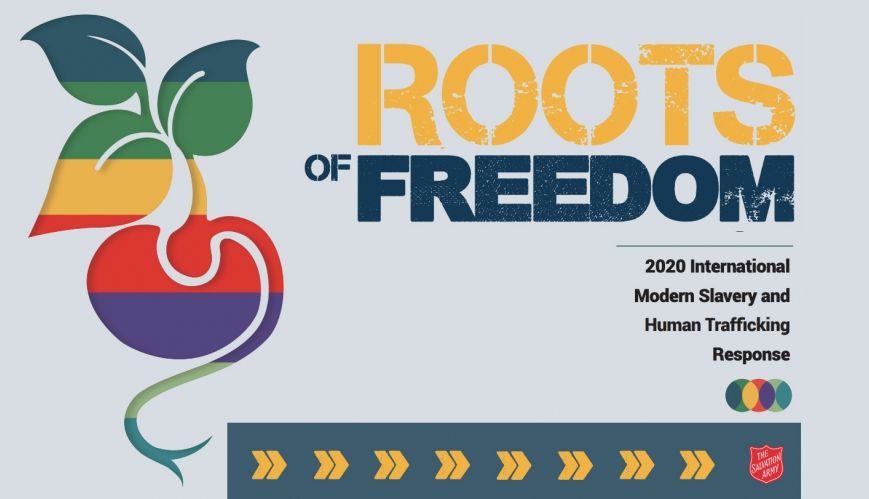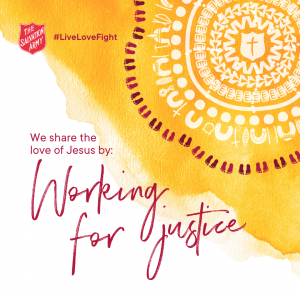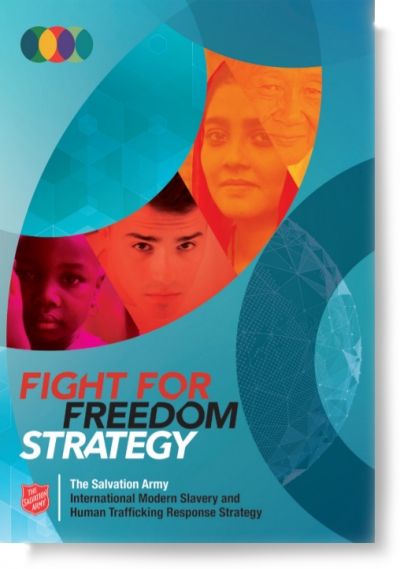Identifying a plan of attack on trafficking, slavery

Identifying a plan of attack on trafficking, slavery
The 52-page Roots of Freedom report covers The Salvation Army’s activity worldwide in working against modern slavery and human trafficking.
Strengthen systems, identify and equip leaders, educate and provide resources, mobilise with holistic responses and expand the global network – these are some of the key priorities to come out of a landmark report into modern slavery and human trafficking just released by The Salvation Army International Social Justice Commission in New York.

The Roots of Freedom report also outlines some of the progress made around the four objectives from the Fight for Freedom international strategy introduced last year – a year described as one of “laying down roots and foundations to support and make allowance for localised and contextualised responses to bloom and grow”.
The 52-page report identifies prioritising increasing survivor engagement and inclusion within the Army as a pivot point in its strategy for change.
Priscilla Santos, who became the inaugural International Coordinator for the Army’s Modern Slavery and Human Trafficking Response in May last year, said the Army could no longer speak about working towards freedom for others without people with “lived experience” having a voice and leadership role in any strategy for change.
“We look forward to welcoming survivor leaders to more spaces of influence within The Salvation Army,” Priscilla said.
In support of that strategy, Malaika Oringo has been appointed as Survivor Chair of the International Modern Slavery and Human Trafficking Response Council. For 17 years, Malaika has been the Army’s anti-human trafficking representative at its European Affairs Office in Brussels. She is the founder of the survivor-led organisation Footprint to Freedom and a member of the International Survivors of Trafficking Advisory Council.
In her introductory letter in the report, Priscilla cited “terrifying statistics” that indicated more than 40 million men, women, and children worldwide are affected by slavery and trafficking. She said the Army had “a unique role in responding to this growing phenomenon”.
In acknowledging the “agility, grit and resiliency” of those working to support survivors throughout a very challenging year, Priscilla said that “no one is more resilient than the survivors of trafficking [whom] we serve”.
 Priscilla Santos and Malaika Oringo – paving the way for change.
Priscilla Santos and Malaika Oringo – paving the way for change.
The report credits the effects of the COVID-19 pandemic as having “exacerbated the vulnerabilities” of those susceptible to exploitation. It identifies how the Army had shifted and adapted its work to help counter traffickers who would take advantage of people with reduced income or who have lost their livelihoods.
A key element is cultivating a partnership with the International Anti-Human Trafficking Network and Joint Learning Initiative on Faith and Local Communities. Along with other organisations, the Army has conducted detailed research leading to an informed and survivor-centred approach in responses around the world.
The report provides an update to build a sustainable response to modern slavery and human trafficking in each of the 132 countries with an official Army presence. Progress includes zonal coordinators for modern slavery and human trafficking response overseeing activity in their specific geographical areas and success in appointing 86 territorial/national contacts across territories, countries and commands.
Building on that deployment of human resources, the report also reflects on aspects of education and resourcing, as the Army seeks to ensure that all personnel are aware of and recognise signs of potential slavery or trafficking. That includes the publication of the guidebook called Fight for Freedom that, so far, has been translated into Spanish and Korean. The guidebook is a global toolbox that provides practice principles on a local, national and international level.
Thirty-nine territorial modern slavery and human trafficking response action plans have been developed, providing tangible capacity to address slavery and trafficking as presented in each national context. For example, in Sri Lanka, a dedicated team of 14 has been established to raise awareness in communities across the island, in Army corps, centres, and through outreach in rural areas.
 Fight for Freedom guidebook.
Fight for Freedom guidebook.
Roots of Freedom provides readers with highlights of action taken through the year to address each of eight focus areas: Prayer, Prevention, Participation, Protection, Partnership, Prosecution, Policy and Proof.
It includes examples such as an opportunity to address politicians at a national prayer breakfast in the Finland national parliament and a unique event in Bangladesh, where 30 women from brothels around Dhaka were able to take part in the Army’s annual Day of Prayer for Victims of Human Trafficking, which provided authenticity and credibility to the event.
In the area of prevention, Roots of Freedom highlights work in 60 neighbourhoods across eastern Kenya which builds on relationships already established with groups such as schools and community groups. The programs have helped identify social injustices such as poverty, unemployment, and tribal conflict and explored solutions through economic empowerment training, guidance, and resources in collaboration with the communities themselves and the local government.
In Singapore, Malaysia and Myanmar, vocational training, such as sewing, welding and repairing motorcycles and mobile telephones, has been offered to equip young people with transferable skills and helping them make a living wage.
The report can be downloaded from the ISJC website at sar.my/rootsoffreedom).
* Edited from an International Headquarters communications department release